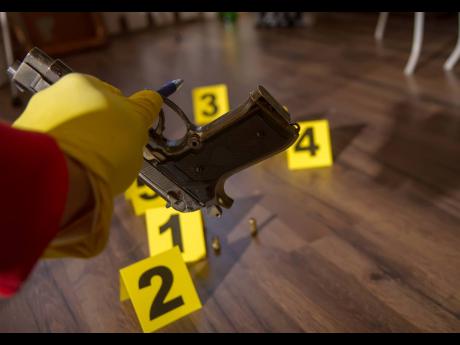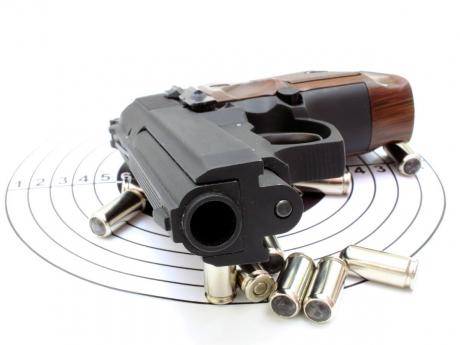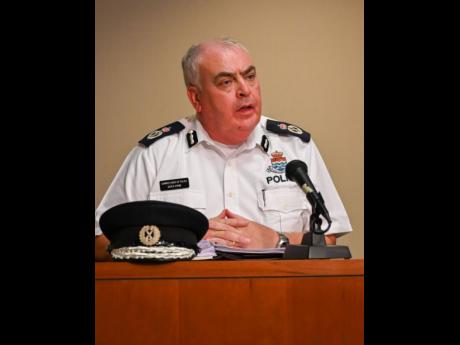Travelling killing machine
- Bloody trail of murders, woundings in Jamaica from gun seized in Cayman - ‘Internationalisation’ of gangs in Caribbean on the rise, says professor
Randy Richards was standing with a group of men on Mint Road in Grange Hill, Westmoreland, on an October evening in 2019. About 5:30 p.m., he was surprised by a group of armed thugs who brazenly opened gunfire at him. Richards, 29, tried to run,...
Randy Richards was standing with a group of men on Mint Road in Grange Hill, Westmoreland, on an October evening in 2019.
About 5:30 p.m., he was surprised by a group of armed thugs who brazenly opened gunfire at him. Richards, 29, tried to run, but was chased and shot repeatedly.
Richards is the first known victim of a handgun seized by the police in the Cayman Islands that has been linked to five murders in Jamaica, The Sunday Gleaner has confirmed.
Last week, The Sunday Gleaner obtained details about the deadly path of the killing machine.
The Taurus 9mm pistol was also used in two cases of wounding, which, along with the murders, occurred over a three-year period ending in September 2021, law enforcement sources disclosed, citing ballistics analysis.
All five murders and one of the wounding cases occurred in Westmoreland. The other wounding case was in Manchester.
In September, the Royal Cayman Islands Police Service disclosed that authorities there seized a single firearm that was linked by ballistics testing to at least five murders in Jamaica dating back to 2019.
Former Cayman Islands Police Commissioner Derek Byrne did not disclose how the gun entered the country, but told journalists during his final press conference that it is now part of a major investigation there.
The Jamaican police have not commented publicly on the case and declined to speak about the ongoing investigation when contacted by The Sunday Gleaner.
AGGRESSIVE EXPANSION OF CRIMINAL GANGS
Jamaican criminal gangs are increasingly “muscling” their way into gang territories in other countries across the Caribbean, said respected academic Professor Anthony Clayton, offering one explanation for how local gangsters and their weapons end up in traditionally crime-free countries in the region.
Typically, guns are smuggled across the region in boats or disassembled and placed in packages or barrels, he said.
Clayton cited, as an example, a Jamaican gang that took up roots in the Turks and Caicos Islands after the local gang was displaced by authorities there.
“So we are seeing this aggressive expansion [of criminal gangs] from Jamaica into the region,” said Clayton, Alcan Professor of Caribbean Sustainable Development at The University of the West Indies.
“Jamaican criminals who move into an environment which has not had the same security challenges that we’ve had may think they are going up against a less defended society and they think this is easy pickings,” he reasoned.
Clayton said Jamaican dons are now realising, too, that they can run their criminal enterprises from overseas and “maintain their personal safety” while they are on the run from authorities here.
“And this is something we are seeing more and more of,” he stated.
Most schemes used to traffic guns to and within the Caribbean are notable mainly for their simplicity, according to Weapons Compass, the first regional Caribbean firearm study that was published earlier this year.
The report noted that unlike the elaborate transcontinental arms trafficking operations documented by United Nations investigators in other parts of the world, schemes used to smuggle firearms to the Caribbean require “minimal knowledge, skill, or planning to execute”.
“There are no convoluted networks of shell companies, complicated logistical or transport arrangements, or elaborate efforts to deceive arms manufacturers or export licensing officials. Such measures are not necessary,” the report said.
MULTIPLE VICTIMS
The second victim of the Taurus 9mm pistol – a Manchester man whose name is being withheld – was shot in the parish on December 10, 2019, but managed to escape his attackers.
Exactly one month later, the Taurus 9mm handgun claimed its third victim and second murder, also on Mint Road in Grange Hill. Tattoo artist Micha Kaye and a female companion were at home when he was shot several times by armed thugs who invaded their dwelling about 10:30 p.m. on January 10, 2020.
Kaye, 35, reportedly ran from the house, but collapsed outside.
The Taurus 9mm pistol was used in two more killings in 2020, according to senior law enforcement sources.
Eric Mahabeer, also called ‘Praddi’, was walking along the roadway in his community of Ricketts River, located in Frome, when he was shot repeatedly by one of two men travelling on a motorcycle.
The killing occurred about 5:15 p.m. on March 24, the police reported.
Nearly three months later, Julian Campbell was gunned down by unknown attackers. Details about that killing were unavailable up to late yesterday.
After a 10-month hiatus, the Taurus pistol resurfaced on April 7, 2021, when it was used to injure a Westmoreland man whose name is being withheld.
Its last known victim, Richard Thompson, was shot to death during a predawn home invasion on September 4, 2021.
Thompson, also called ‘Poo Poo’, 24, was at his Seaton Crescent, Savanna-la-Mar, home when men posing as police kicked down a door and sprayed him with bullets, according to a police report.
The weapon went dark for a while, resurfacing in the Cayman Islands a few months ago. The police there were able to make the link to the crimes in Jamaica due to a regional collaboration among law enforcement, which includes networking in firearms forensics and ballistics.
ONLY A MATTER OF TIME
Professor Clayton believes that it was “only a matter of time before we see this kind of thing” where a weapon used in Jamaica is seized in another jurisdiction.
He said that this year, for the first time ever, the expatriate population in the Cayman Islands outnumbered indigenous “Caymanians”, adding that a big part of that was the Jamaican diaspora.
“People go to do domestic work, they are working in the police force, they are working in the banking sector and, sadly, [along with] that group of people who are going for legitimate economic reasons, there are people who are going because of the criminal opportunities,” he said.
The professor disclosed that he co-authored a soon-to-be-published paper which shows that the level of preparedness across Caribbean nations to deal with violent criminal networks “varies widely”.
“Some countries do not have adequate legislation, they don’t have clear lines of responsibility, they’ve got different approaches, some don’t do enough by way of effective searches and so we don’t have a coherent approach across the region,” he said.
“So, unfortunately, the sad truth is that there are countries in the region now that are going to have to increase investments in their security, not because of their own problems, but because of the problems that other countries are exporting to them.”
Clayton believes that in recent years, there has been an increasing “internationalisation” of criminal gangs in the Caribbean, fuelled largely by the political and economic turmoil in Haiti.
He noted, as an example, that based on current projections, Haitians are expected to be the largest ethnic community in the Turks and Caicos Islands in the next decade or two.
“Now, most of them are just refugees, but, unfortunately, there are criminals in that group and, in some cases, they are taking their weapons with them,” said the respected academic.
“So they are now having armed robberies in Turks and Caicos. This is unprecedented. They have been at peace for something like 40 years and now they are getting armed robberies.”




